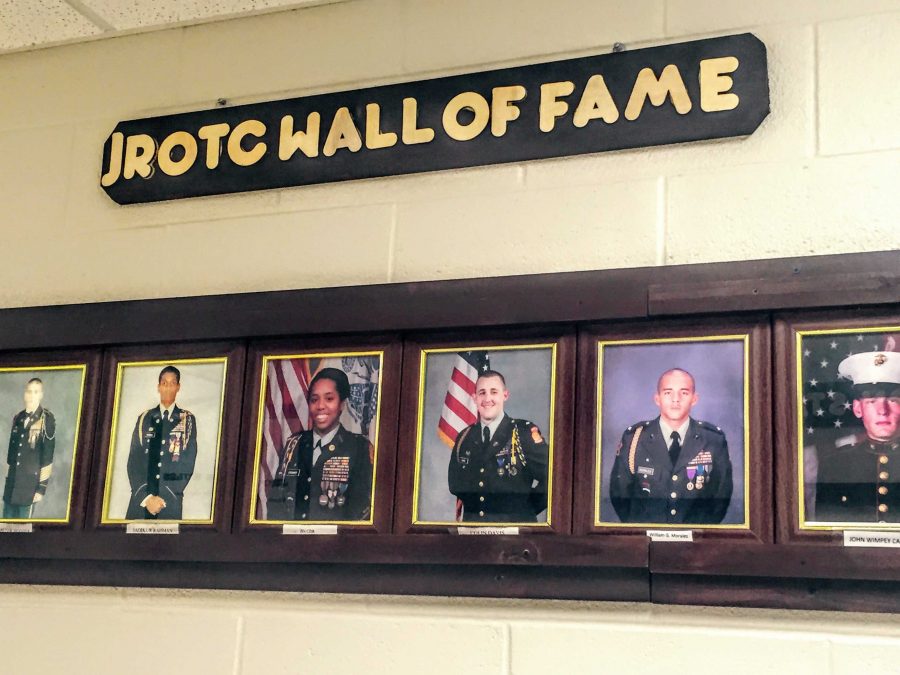The Junior Reserve Officer Training Corps is a program that motivates students to become better citizens, to have useful life skills, to be leaders, and to be responsible.
JROTC is an middle and high school elective that is designed to allow students to lead the program and instructors to give guidance. It is set up like a full military battalion with leaders of rank and staff, although it’s purpose is not to recruit members into the military.
JROTC has been in existence since 1916 under the passage of the National Defense Act as the United States prepared to enter World War 1. The program has been at Chamblee Charter High School since 1993.
“[Retired] Lieutenant Colonel Charles Sitero and Chief Warrant [Garry] Williams, they started the program at Chamblee,” said First Sergeant E8 Terry Horton.
Horton has been the leader of the program since 1998. Since he began, a number of cadets have gone into the military.
“[Joining the military] is not our primary mission. We’re not recruiters and we don’t push kids toward the military,” said Horton. “There’s no obligation for kids taking JROTC to join the military. However, if an individual decides he or she wants to go into the military, this program would help because the kid would enlist with rank.”
JROTC is also helpful when applying to college. At the college level, students can get Reserve Officers’ Training Corps (ROTC) scholarships.
Many of the ROTC instructors at the college level are military officials that are in active duty, while at the high school and middle school level, they tend to be retired officers.
Currently, Horton is a retired First Sergeant E 8; E 8 represents the pay grade of a non-commission officer, second only to an E 9.
Horton is responsible for the 135 members in the programs, many of whom joined out of curiosity or had family members in the military.
“My whole family is military, so I decided why not,” said new member and sophomore Cheyenne Banwarie. “On top of that, I’ve always been curious as to what the program was like ever since I was in the third grade, so it was kind of a win-win situation for me to join anyway because of the scholarships also.”
JROTC does a variety of activities around Chamblee including the Color Guard before sporting events, campus beautification, the Pledge of Allegiance in the morning, escorts on Curriculum Night, Color Guard on Honors Night, and fundraising.
Also, JROTC offers a wide variety of opportunities for members to grow, to challenge themselves, explore interests, and learn new things.
“The number one thing I enjoy is just being on the different teams like the Rifle team, the Drill team, the Raider team,” said Cadet Lieutenant Jahfel Jones, a senior at Chamblee. “Being around new cadets, getting to get them into the program lifestyle with discipline, being mannerful, and getting them to become a cadet.”
JROTC has four extracurricular teams: the Raider, Drill, Academic, and Rifle team, all of which compete in competition throughout the year.
“I’ve done all the different teams in the program and competed in them,” said Jones.
Though being on a team is not required, it allows members to be more involved and find goals to strive for. JROTC members set goals within the program both long-term and short-term.
“It’s a stretch, but probably I want to at least maybe rank up to Sergeant First Class and also if I could because I haven’t seen any of the ROTC students that were the leader, like the face of the actual program be female, so I’d love to be the Bulldog Battalion Commander,” said Banwarie.
Six main members lead the program, each with specific jobs.
Being an officer is something to strive for, but it takes applications and interviews to earn a spot. Members who bring valuable aspects to the program have increased chances of earning a position.
“As a freshmen I told myself I’d be an officer of the ROTC program and I did by the end of my freshmen year, I made First Lieutenant and by the end of my junior year I made Lieutenant Colonel,” said Jones.
Awards administered throughout the course of the program are based on how involved members are and what they participate in.
“You get what you give,” said Banwarie.
In addition, not all JROTC members have plans to join the military in the future. The Navy, Army, Air Force, and Marine Corps are all probable options for the members to join or as a backup plan.
“I plan to go to college and let the military pay for my college,” said Jones. “After that I hope to be awarded a commision. . . . and plan to make the military life a career.”








